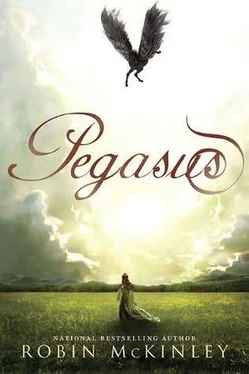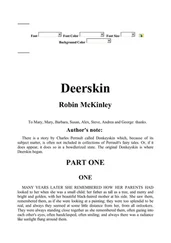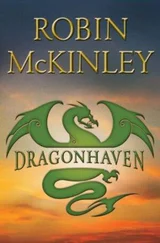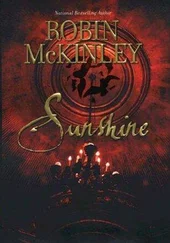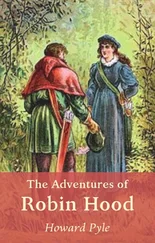Lrrianay said something to Ebon. Ebon, she thought, asked something in return—she caught a sense of a rippling phrase, a pegasus question, although she could not hear what it said. Sylvi looked inquiringly at her father, but he said, “ This is for Ebon to tell you.”
Ebon shouted or neighed something, suddenly, briefly, an astonishing, startling sound, especially indoors, in the king’s small office, surrounded by human furniture. The sound her ears heard was accompanied by a sensation like a kick inside her head—cautiously she put her hands up as if checking that her head was still securely fastened—and Ebon did a prance and bounce where he stood. There was a behave-yourself snort from his father—parental disapproval was easily recognisable across the language barrier—and Ebon said, I can’t help it. This is the best, the best. Syl, you can come home with me—I mean, will you please come home with me? To where I live. I mean, I’m inviting you. This is my birthday present to you. That you come to Rhiandomeer—to my country. To the pegasus country. Like we went home with your mum last year. Will you come? Please. Please say yes. You wouldn’t believe what I’ve been through for this. Syl, I can even take you to the Caves! Please say you’ll come! Please!
To—? said Sylvi. To—? She could feel the disbelief on her face, hard and stiff as a mask. She looked at her father. He was still smiling, but it was now a sympathetic smile, an encouraging smile. He nodded. She put her hands up again, touching her own face, pulling the mask away.
Home with you! Of course I’ll come! Of course! Oh, Ebon, really? And the Caves? She threw her arms around his neck and was promptly blinded when he swept his wings forward, around her: she could feel his feather-hands dancing like butterflies in her hair.
Now that the heroic deed was accomplished, Ebon poured out the tale of the doing of it: I started with Dad, of course. I’d figured if I got Dad on my side that was all I needed—I guessed there would be a lot of dust and shouting on the human side so I started—oh, months ago—but I thought our side would be pretty simple, other than, oh, you know, Gaaloo and a few like him. Dad was expecting it. He told me later he was sure I’d ask for your sixteenth birthday. I kind of knew it would have to be a public thing—like going to your fêtes here—but I wasn’t expecting it to be as big as it was. And I also thought, you know, Dad’ll take care of it. But he didn’t. He said he’d back me but I was the one who was going to have to do the talking. Gods and clouds, I didn’t know we hadthat many shamans! And they all wanted to know why I thought bringing a human home was a good idea. Never mind the Caves!
Humans rarely ventured into the pegasus lands—they didn’t even have a proper name in any human language: the original treaty with King Balsin only specified them as the Lands of the Pegasi, and drew some lines on a map. A few human wanderers had penetrated into the edges of the pegasi country, the sort of folk who travelled because travelling was in their blood and they couldn’t help themselves. But they never went farther than a day’s journey in from the boundary and never stayed longer than a few days—which was especially surprising in light of the fact that all foot ways into the pegasus country were long and difficult. All that effort and you turn around? Sylvi thought. But there had never been even one official expedition, and there’d apparently never been any discussion about making an easier way in—not so much as a track a laden pack animal could follow easily.
It was curious, Sylvi thought, that all her fellow humans had been so uninterested—how could they be uninterested?—for so many years. She thought of the second commander’s journal: “. . . They are like nothing I have ever seen, except perhaps by some great artist’s creative power.... Several of my folk came to their knees, as if we were in the presence of gods; and while I did tell them to stand steadfast, I did tell them gently, for I understood their awe” . . . or maybe that was why. Nearly a thousand years of familiarity hadn’t really changed that sense of awe.
She had nonetheless said something about it to Ahathin, years ago, when she was first studying the Alliance.
“It is curious,” Ahathin had replied. “I agree.”
“Curious!” she said. “Is that all you can say? It’s the pegasi. ”
“Yes,” said Ahathin, “which may be the answer.”
She put her head in her hands. She knew that if she said “What do you mean?” he wouldn’t respond. She thought about the crowned pegasus on the royal standard; why did the relationship between pegasi and humans seem to have borders around it as absolute as the bound edges of a banner? “Because we don’t know why having the pegasi here means our crops grow and—and nobody is struck by lightning?” Nar II had several nicknames; one of them was the Lightning King. Old Glunch was another; he was also famously grumpy. He didn’t like the pegasi because he didn’t like anyone, and while there had been no wars—and no roc sightings—during his reign, it had been remarkably accident-prone, including an unusual number of lightning strikes.
Ahathin nodded. “What do you remember of Nar’s pegasus?”
She didn’t quite groan. Teachers . “Um. Oh. Queen Sufhwaahf. She—she came here anyway, bringing a few courtiers who could put up with Nar’s temper. Some historians say she’s why nothing worse happened.” Which only contributed to the bound-edges feeling, she tho ught.
There was a little silence, and Ahathin said, “ The usual reason given, if the subject comes up at all, is that we’ve always found enough to do in the lowlands. Balsin, I believe, was the first to make that excuse.”
We’re afraid, Sylvi thought with a shock. We’re afraid of what we might find, beyond the sleek pretty paper and the little embroidered bags, if we went exploring. She thought of her mother saying, You know where you are with a taralian. We’re afraid of the pegasi, thought Sylvi, but she didn’t say it aloud. If she did, Ahathin, by his silence, would make her say more, and she didn’t want to say any more. She was wrong. She had to be wrong.
After she had Ebon to talk to she said to him, You don’t mean to keep us out, do you? Out of your country, and Ebon looked surprised. No. You lot just don’t want to come.
Why? said Sylvi. Ahathin says it’s because we’ve always found enough to do in the lowlands. But there must be more to it than that.
I don’t know, said Ebon. I’ll ask.
But the answer he brought back to her was even less of an answer than what he had told her about why the pegasus shamans had not been party to the writing of the treaty. They don’t come, was the only response.
Why? Ebon had said.
Because they do not.
Sylvi snorted with laughter—she’d noticed that her laugh had become much snortier since she’d had Ebon to spend time with, who himself had a very snorty out-loud laugh. That’s not an answer, she said.
That’s what I told them!
And then what did they say?
That they began to understand why you and I could understand each other, said Ebon. And they both laughed.
That was as much as she’d ever brought up the subject of humans in pegasus country to Ebon. She’d never asked, nor even hinted, for an invitation, although she thought of it often. The tactical problems were severe enough—how long would it take a party of humans to clamber up and across the Starcloud Mountains? Longer than her father would let her be away from the palace, she thought, let alone the size of the troop he would feel it necessary to send with her; they might be safe from taralians and so on once they arrived, but they wouldn’t be on the journey. And she was careful—or she tried to be careful—not to say, Oh, I would love to see that! when Ebon told her about his home. (She had expressed a wish to taste fwhfwhfwha and Ebon had said dubiously that he’d bring her some some time, but he thought it probably wouldn’t like being bounced around in transport.) She had also asked her father why no human ever visited the pegasi: “I know it’s a long way! But it’s not as far as to Swarl or Chaugh, where the traders go every year. But nobody goes to the pegasi—not even us! Not even us who are bound to them!”
Читать дальше
